










psychotherapy, narrative therapy and psychodynamic therapy.
Most psychologist rooms don’t have a couch. We tend to sit on chairs.
When should I see a psychologist?
People attend psychology sessions for a wide range of issues and reasons. It may be a mental health issue, such as depression or anxiety, addiction or dependency, trauma or abuse, psychosis or schizophrenia. It could be for workplace issues, such as bullying, help with school or study, improving performance or to gain greater understanding of themselves.
Psychologists provide individual counselling. Some also see couples or families. Counselling provides a safe space to discuss issues and provides patients with support, which may not be available from their social or family network.

What do psychologists do?
We provide skills and techniques to help manage issues. For example, a person who experiences anxiety attacks would be given skills to understand anxiety and techniques to manage it.
Neuropsychologists undertake assessments to determine functionality. For example, a person who has an acquired brain injury from a motor
vehicle accident may consult a neuropsychologist, who will make recommendations.
Some people may have a loved one recognise that their cognitive functioning has changed, or they may recognise this themselves. A psychologist may undertake memory testing to verify this diagnosis.
In addition to talking with a patient, psychologists may ask him/her/them to complete a questionnaire to help inform treatment.
Some psychologists work exclusively in a particular area. For example, a sports psychologist works with sports people and assists them with motivation and to reach their goals. Some specialise in working with children and adolescents.
What is the difference between a psychologist and a psychiatrist?
Psychologists are not medically trained and therefore cannot prescribe
An Australian Jewish actor and comedian has made the finals of the international Smart Fone Flick Fest (SF3) with his first movie short.

Now in its eighth year, SF3 attracted more than 300 entries (all shot and edited entirely on smart phones and tablets) from around the world.
Fifty were selected to screen live and online between 5th and 20th November (www.sf3.com.au).
Films are entered in several categories, including mini (up to five minutes), shorts (under 20 minutes), features (40 minutes plus), 3D movies and school age entries.
Thirty-four-year-old Jared Jekyll’s threeminute Free Hugs is a finalist in the mini section.
Co-produced with Seaton Kay-Smith, a descriptor for the short reads as follows: “When Trevor turns down a free hug, his luck goes from bad to worse. Is it a curse?”
As an actor, Jekyll previously won Best Actor for Sad Sachs at the 2019 Smart Fone Flick Fest.
He also claimed Best Supporting Actor at the 2017 Sydney International Film Festival for the short Jinxed.
Jekyll is a music theatre graduate from the Australian Institute of Music.
He is best known for his appearances as a stand-up comedian as well as on The Comedy Channel, ABC TV and Triple J.
Jekyll has also penned more than a dozen plays and appeared at the Sydney Comedy and Melbourne Cabaret Festivals.
medication. Psychologists may work with psychiatrists, who are medically trained, to treat patients.
What are the different types of therapy?
There are a number of therapies that psychologists use, the three most popular being:
• CBT (Cognitive Behaviour Therapy), which works on the premise that the environment determines what you think, which in turn informs what you feel and what you do.
• DBT (Dialectical Behaviour Therapy), which is CBT on steroids – a more complex version that teaches skills for mindfulness, emotion regulation, distress tolerance and interpersonal effectiveness.
• ACT (Acceptance and Commitment Therapy), which helps people understand and change their relationship with unhelpful thoughts. Other therapies include motivational interviewing, psychodrama, short term

Psychologists sometimes use expressive therapies such as art or music, sand therapy and, for children, play therapy.
Most psychologists utilise a number of different therapeutic approaches, based upon client needs.
How old do you have to be to see a psychologist?
Psychologists work across the whole of life, from peri-natal, to child and adolescent, and adult.
Is it expensive?
Costs vary. With a mental health care plan from a GP, patients can receive a rebate from Medicare for up to 20 sessions a year. Some private health funds have psychology rebates available under extras cover. Psychologist also may see clients from the Department of Veteran Affairs, the Department of Defence, Employee Assistance Programs, WorkCover, the Transport Accident Commission and Victims of Crime.
If you feel you may need to speak to a psychologist, ask your GP for a referral.
Speaking to a psychologist does not mean you will be in therapy for life. Sessions can help you to gain perspective, understand yourself better and live your life differently.
Anne-Marie Elias is a psychologist in clinical practice for 25 years.

How many common words of five or more letters can you spell using the letters in the hive? Every answer must use the centre letter at least once. Letters may be reused in a word. At least one word will use all seven letters and have a direct Jewish connection.
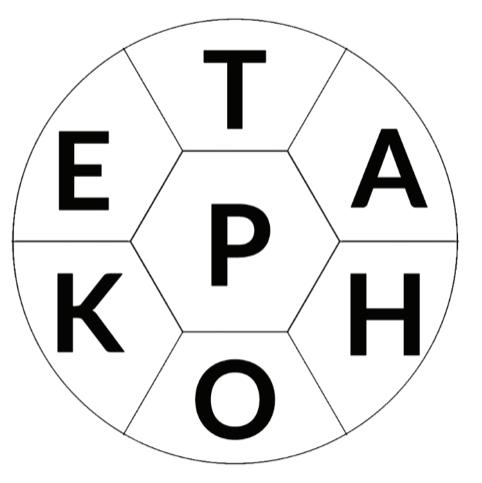
Proper names and hyphenated words are not allowed. Score one point for each answer and three points for a Jewish-related word that uses all seven letters.
Rating: 5 = Good; 7 = Excellent; 9 = Genius
United Israel Appeal will launch its 2023 Campaign at events in Sydney, Melbourne and Perth in November with guest speaker Sam Grundwerg, the world chairman of Keren Hayesod-UIA.



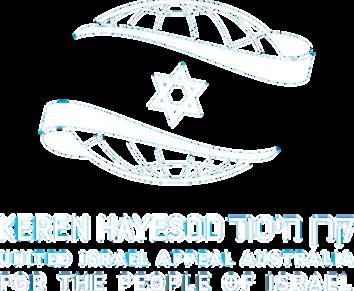
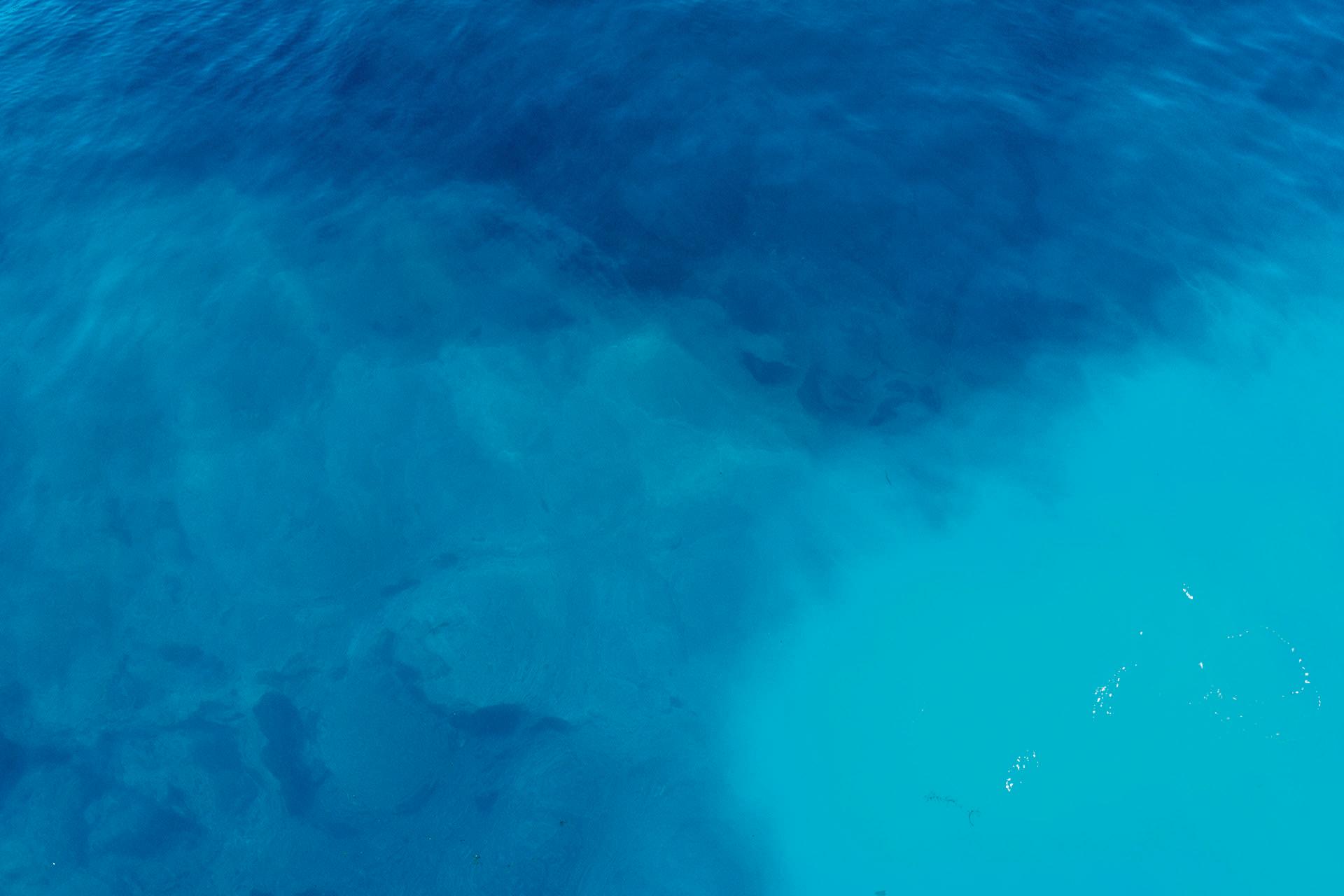
After a two-year hiatus, the organisation is pleased to be able to hold these events in person. The community is welcome to attend.
Grundwerg will speak at UIA’s Campaign launches and AGMs in NSW on Monday, 14th November and in Victoria on Thursday, 17th November as well as at UIA Western Australia’s Major Donor event on Sunday, 20th November.
From 2016 to 2018, Grundwerg served as Consul General of Israel in Los Angeles. He was previously director general in Israel for the World Jewish Congress, an international organisation representing Jewish communities in more than 100 countries. At the WJC, Grundwerg advanced the overall mission to strengthen and support Jewish communities around the world, along with the State of Israel and the Jewish People. He was recently named in The Jerusalem Post's top 50 most influential Jews of 2022.
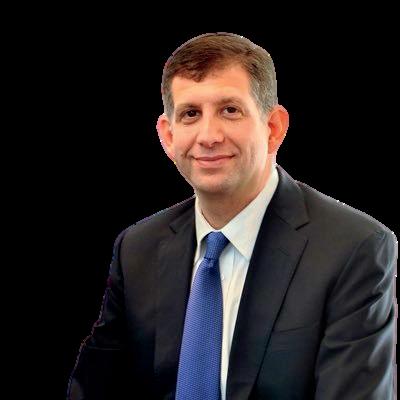

The NSW event will also include a livestreamed analysis of the Israeli


and defence analyst for the paper from 2003 to 2013. In 2013, Katz became a senior foreign policy advisor to Israel's Minister of Education and Diaspora Affairs, Naftali Bennett.
These events provide UIA with an opportunity to report back to the community on the year’s fundraising activities and showcase the impact
UIA’s work. The organisation will hear from a Ukrainian olah who was rescued from war-torn Ukraine, as well as the significant assistance UIA has provided in other areas of the national priorities.
A change of leadership in Victoria, NSW and WA, with all three presidents retiring after many years of dedicated service, will also be formally announced. In Victoria, Hayley Southwick will hand over the leadership to Peter Horovitz, in NSW it will be Andrew Boyarsky to Gary
Perlstein, while in WA Todd Wilner will welcome David Karotkin. UIA will also launch a rebrand at the upcoming November events. The new look will see the organisation as a united national brand, to be rolled out across the country.
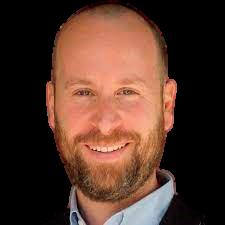
Additionally, Stephen Cordell OAM, a governor of UIA NSW, will be presented with the highly regarded Keren HayesodUIA Yakir Award, which recognises his commitment and volunteerism to the organisation in Israel and throughout the Jewish world. The award was formally presented at the KH-UIA annual leadership conference in Jerusalem earlier this year, but Stephen was unable to attend the event.
UIA Australia CEO Yair Miller OAM said: “This year’s AGMs will be particularly poignant, with moving testimony from Jews rescued from mortal danger highlighting UIA’s importance and impact. We also welcome a change in the leadership in NSW, Victoria and West Australia and the launch of our campaign for Israel’s 75th anniversary. It will be an important evening with our world chairman in attendance and an opportunity for all donors and supporters to truly understand our collective impact on the People of Israel. I sincerely hope you can join us.”
To register, click onto bit.ly/UIANSWAGM, phone 9361-4273 or email info@ uiansw.org.au Follow UIA on Facebook and Instagram (@uiaaus) to stay up to date with our latest news and events.
In 2020 they got together to form Fashion Forward, a social enterprise with a conscience, designed to find new homes for preloved designer wear.
All proceeds the women raise go to Jewish House in Sydney (www. jewishhouse.org.au).
Over the past two years the pair has saved an enormous amount of clothing from ending up in landfill.
In the process, they have raised more than $80,000 for Jewish House’s crisis care for women and children.
Nicole says what she and Sharon do is “a labour of love”.
“Shopping in our studio is a lot of fun; it’s a total feel-good experience.
“Where else can you shop, get incredible high-end labels at bargainbasement prices and support those in crisis at the same time?
“It's the ultimate guilt-free shopping experience,” she says.
Fashion Forward has a new pop-up shop at 97 Glenayr Avenue, Bondi, which is open on Thursdays and Sundays between midday and 4pm.
Otherwise, you can shop online on Instagram (@fashionforward_jh_retail) at 7:30am on Wednesdays and Friday, but remember to be quick as the best items
sell quickly. If you have preloved designer labels to donate to Nicole and Sharon’s burgeoning wardrobe, please contact them directly to arrange collection.

Nicole can be reached on 0411 861 300 and you can call Sharon on 0402 761 813.
 Nicole Katz and Sharon Aaron are Jewish mums with a shared love of fashion, community and the environment.
Nicole Katz and Sharon Aaron are Jewish mums with a shared love of fashion, community and the environment.
Professor Yaakov “Koby” Nahmias is an Israeli biomedical engineer and entrepreneur. After serving as a faculty member at Harvard Medical School, Nahmias now calls The Hebrew University of Jerusalem home.

In the last decade, Nahmias has raised more than $12 million in competitive research funding. He is the founder of Future Meat Technologies, a global leader in cultured meat (meat grown in a laboratory) and Tissue Dynamics, a drug development company. Arguably, these two firms do more for the environment, as well as finding alternatives to animal experimentation, than most companies.
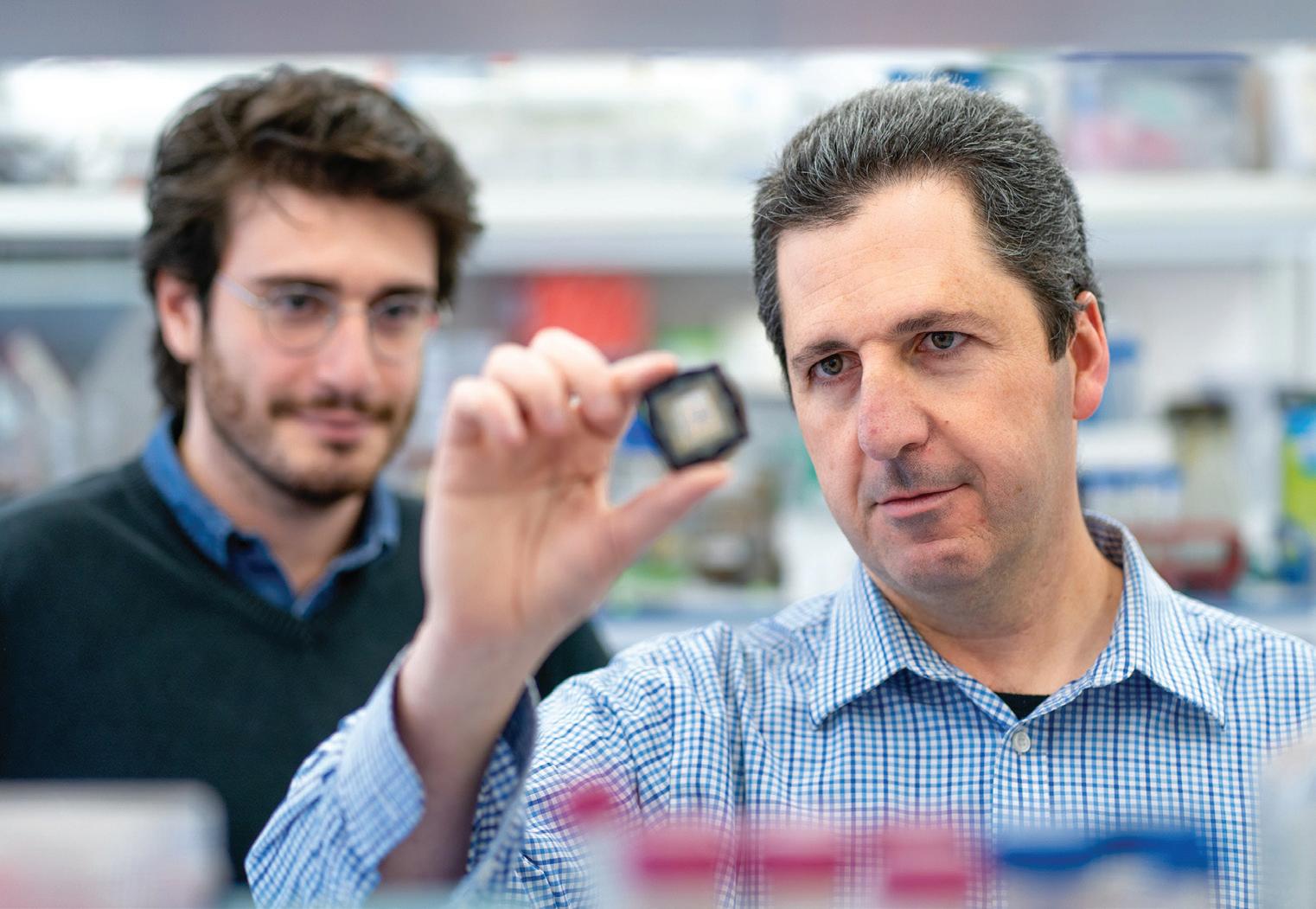

Ahead of his upcoming Australian visit, The Jewish Report spoke with Professor Nahmias.
Why did you make Hebrew University your home?
The Hebrew University is Israel’s number one university. It consistently ranks in the world’s top 100. I was offered an opportunity to build a centre for bioengineering. I couldn’t pass up the chance to build something new.
Hebrew U offers the freedom to seek accomplishments in academia and


introducing myself and starting to teach them the basics of human physiology.
What has been your biggest research breakthrough at Hebrew U?
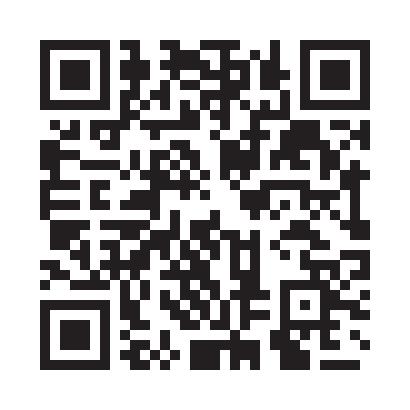
One? We have had more than 20 patents over the last decade and quite a few research papers in the scientific journal Nature Cell Biology. The most recent work is always the most exciting. Recently, we identified a new mechanism of arrhythmia in human micro-hearts.

It is always exciting to rewrite important chapters in textbooks … changing the basic understanding of human physiology.
At the invitation of the Australian Friends of Hebrew University (AUSTFHU), Professor Nahmias will be visiting
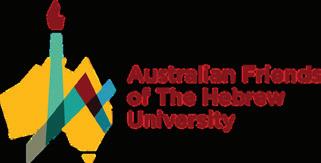
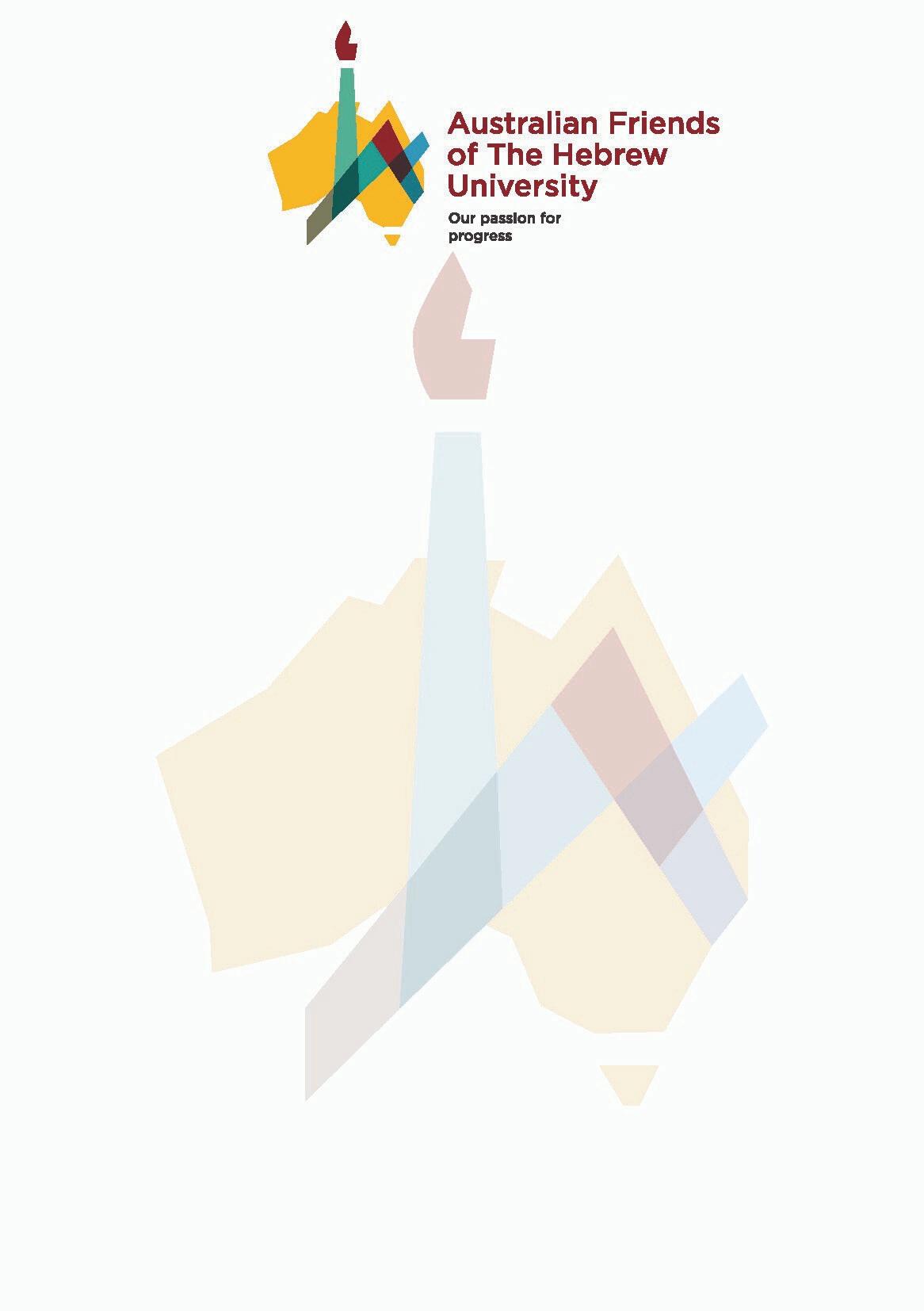
beyond. The university supports student and faculty innovation more than most other institutions in the world.
Why should potential students choose to study at Hebrew U?
Hebrew U counts eight Nobel laureates among its faculty members
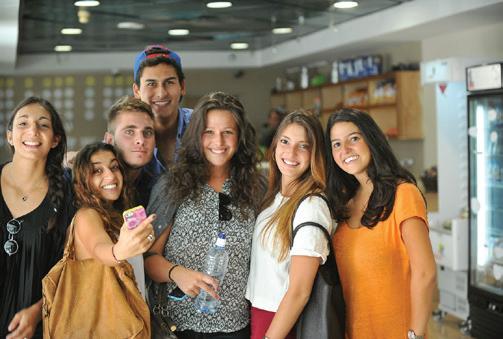

A heartfelt thank you to readers who have reached out to say just how much they enjoyed answering the dedicated Rosh Hashanah edition quiz at so many Yom Tov tables recently. The positive feedback is received with thanks!
Rabbi David Freedman is back with a fresh quiz – once again he effortlessly dips and dives into the global Jewish landscape of past and present. You’ll find your ‘Yiddishe Kop’ – your mental agility, stretched in the best possible way!
Explore literature; history; geography; the bible; the arts, sport and so much more – all viewed through a Jewish lens.
Enjoy!
1. Which year was the Sydney Chevra Kadisha founded? a) 1789 b) 1809 c) 1817
2. The Source is a historical novel by James A. Michener. It is a survey of the history of the Jewish people and the Land of Israel from pre-monotheistic days to the birth of the modern State of Israel. James Michener was a member of which religious group?
3. The National Theatre of Israel is known in Hebrew as what?
4. Salo Baron (May 26, 1895 – November 25, 1989) was a Polish-born American Jew, described as the greatest Jewish: a) Economist b) Historian, or c) Ventriloquist of the 20th Century?
5. Eugenio Pacelli signed an agreement with Adolph Hitler in 1933. He died in 1958. Of which country was he the head of state?
6. Galei Tchelet Street is considered to be the most luxurious and most expensive street in Israel. Where is it located?
7. Eliyahu Korngold was born in Nuremberg in 1907 and displayed a rare artistic talent from an early age. After studying at the Gymnasium, Korngold attended the Kunstschule der Stadt Nurnberg, the city's School of Graphic and Applied Art, completing a six-year course of graphic art, applied art, and stained glass in three years. After coming to Israel in 1933, he changed his name and by the early 1960s, began to work on what would become his most significant work. He was committed to publishing a Hebrew Bible designed, edited, printed, and bound by Jews—something that had not been accomplished in nearly 500 years. What was the name of the company he founded?
8. The following three quotes are attributed to which Jewish-American actor, director and writer?
Friday, Oct 28, 2022 7:01 pm
Shabbat ends, Oct 29, 2022 7:59 pm
Friday, Nov 4, 2022 7:08 pm
Shabbat ends, Nov 5, 2022 8:06 pm
Friday, Nov 11, 2022 7:14 pm
Shabbat ends, Nov 12, 2022 8:14 pm
Friday, Nov 18, 2022 7:21 pm
Shabbat ends, Nov 19, 2022 8:21 pm
Friday, Nov 25, 2022 7:27 pm
Shabbat ends, Nov 26, 2022 8:29 pm
Friday, Dec 2, 2022 7:34 pm
Shabbat ends, Dec 3, 2022 8:36 pm
Friday, Dec 9, 2022 7:40 pm
Shabbat ends, Dec 10, 2022 8:42 pm
Friday, Dec 16, 2022 7:45 pm
Shabbat ends, Dec 17, 2022 8:47 pm
Friday, Dec 23, 2022 7:48 pm
Shabbat ends, Dec 24, 2022 8:51 pm
i) “I'm not afraid of death; I just don't want to be there when it happens.”
ii) “I don't want to achieve immortality through my work; I want to achieve immortality through not dying. I don't want to live on in the hearts of my countrymen; I want to live on in my apartment.”
iii) “You can live to be a hundred if you give up all the things that make you want to live to be a hundred.”
9. Who in the Bible is said to have been buried in an aron (a coffin or box) in Egypt?
10. The Me'am Lo'ez initiated by Rabbi Yaakov Culi in 1730, is a widely studied commentary on the Tanakh. In which language was it originally written?
11. Which of the following statements are correct?
a) The Bible is the best-selling book in history b) China produces the most bibles in the world today
c) The Bible is the most commonly stolen book in the world
12. What was the name of the book on Jewish philosophy written by Joseph Albo?
13. Who wrote: a) the music & b) the lyrics for My Fair Lady?
14. Who said, “There are two things that are infinite, the universe and man's stupidity, and I am not sure about the universe.”
15. The mother of which famous biblical personality was told not to drink alcohol in advance of becoming pregnant?
16. Why is the Uzi machine gun so named?
17. Who created the stained glass windows for the synagogue of the Hebrew University's Hadassah Medical Center in Jerusalem?
18. Which Chasidic leader was the great-grandson of the Baal Shem Tov (the founder of Chasidism)?
19. Why was the Aleinu prayer censored by Christians in the Middle Ages?
20. Born in September 1972, which actress whose paternal great-great grandfather was a rabbi in Nowogród, Poland, won an Oscar for her performance as Viola de Lesseps in the historical romance film Shakespeare in Love (1998)?
21. According to Israel Fast Facts, CNN Editorial Research published in May 2020, what is the median age in the State of Israel: a) 30.4 b) 40.7 or c) 50.3?
22. Where would one find the Marais?
23. Name the four species used on Sukkot.
24. In soccer, who are the current champions of the Israeli Premier League?
25. Born in 1903 in a village near Warsaw, he was the son of both a rabbi and rabbi’s daughter. He died in 1991 in Florida, and was buried in Cedar Park (Jewish) Cemetery, New Jersey. He won the Nobel Prize for Literature in 1978 –who is he?
Rebecca Paratz from Bialik College in Victoria has won first prize in the 2022 Mikolot: Voices of the Future Public Speaking Competition.

Second prize went to Naomi Kawaz from the Carmel School in WA, while third place was South African entrant Noa Nerwich, from King David Linksfield in Johannesburg.
The judging panel consisted of The Honourable Justice Rabbi Marcus Solomon, Cheryl Bart AO, Josh Burns MP and Paul Rubenstein from Arnold Bloch Leibler.
Mikolot is a Moriah College initiative, backed by The Moriah Foundation, as part of its endeavours to bring innovative programs and global opportunities to students at Jewish schools.
Launched in 2014, together with The Joint Australia, the competition aims to bring together Jewish pupils and foster a more refined expression of Jewish voices.
Six students made this year’s grand final.
They included Asher Freedman from Moriah College and Asher Hasofer from Masada College, along with Bialik College students Dana Bagle-Zevin and Rebecca Paratz.
The two others were Naomi Kawaz and Noa Nerwich.
All grand finalists were asked to prepare an impromptu address and a four-minute speech.
The formal topic was: “Do I really matter”? In Jewish thought, there is a relationship between God’s presence in the world and our freedom of choice. One of the existential questions based on this is ‘if God controls the world, does what I do really matter?’ How do you reconcile this tension and how does your approach impact the way in which you contribute to the Jewish people and the world at large?”
All place getters received a major contribution towards an approved Israel program with the support of The Moriah Foundation and the competition’s corporate sponsor, Arnold Block Leibler.
Year 11 student David Loven is striking in his eloquence.
“I am very passionate about Jewish identity, my community and ensuring it is a safe one,” says Loven.
“Out of my own experience of antisemitism, we decided to address the issue. Many forms of racism stem from ignorance and a place where ignorance has no place is in the education system.”
During B’nai B’rith’s Australia and New Zealand Triennial Convention conference, held in Melbourne recently, Loven and members of the J-Voice committee of students delivered a significant presentation.
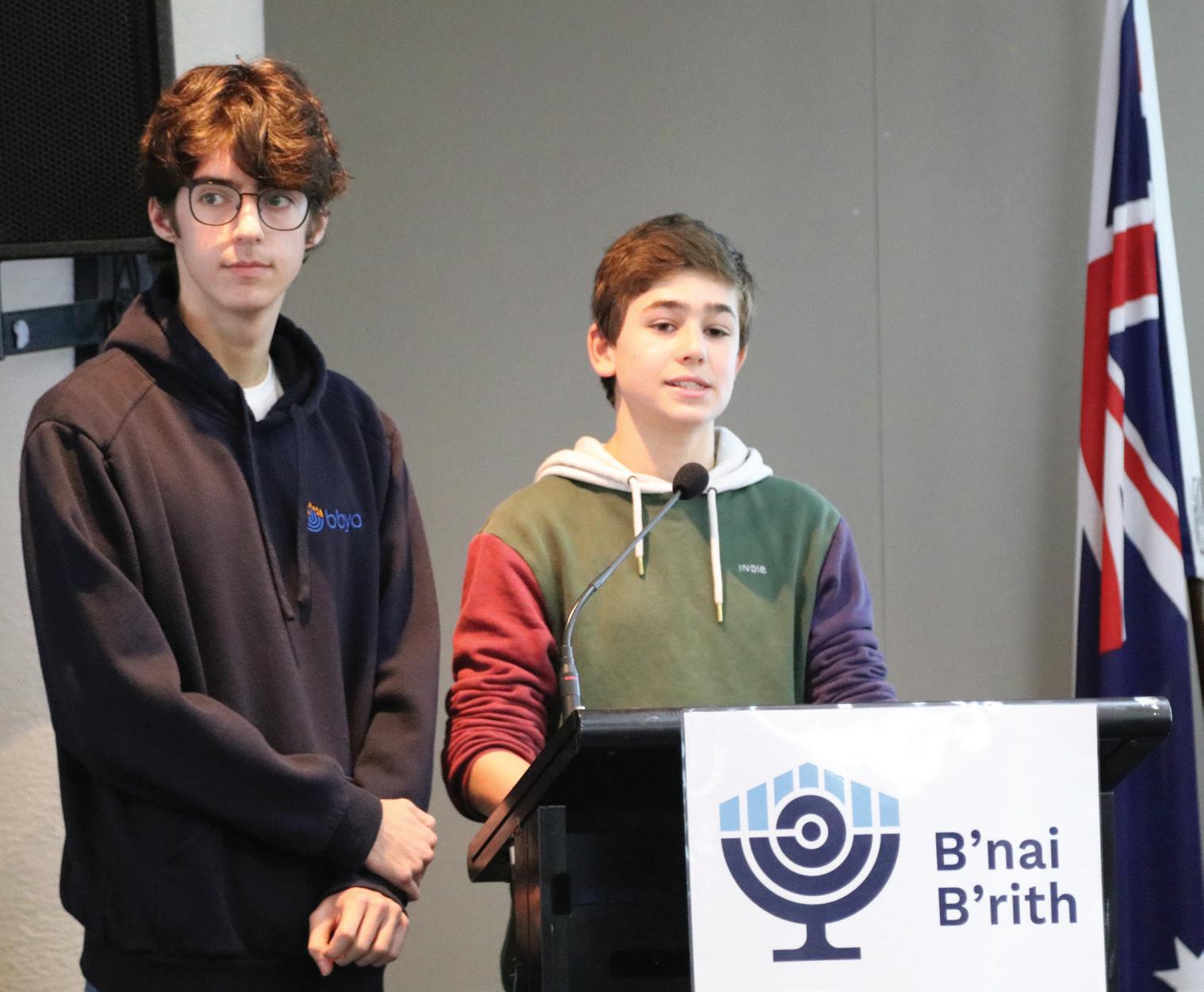
It was based on a report they compiled (titled Being Jewish in a nonJewish School) on the experiences of Jewish students studying in government schools.
“Given a measurable prevalence of antisemitism and, in some case, the progression into physical harm, we felt it was necessary that something be done now and not later,” Loven said.
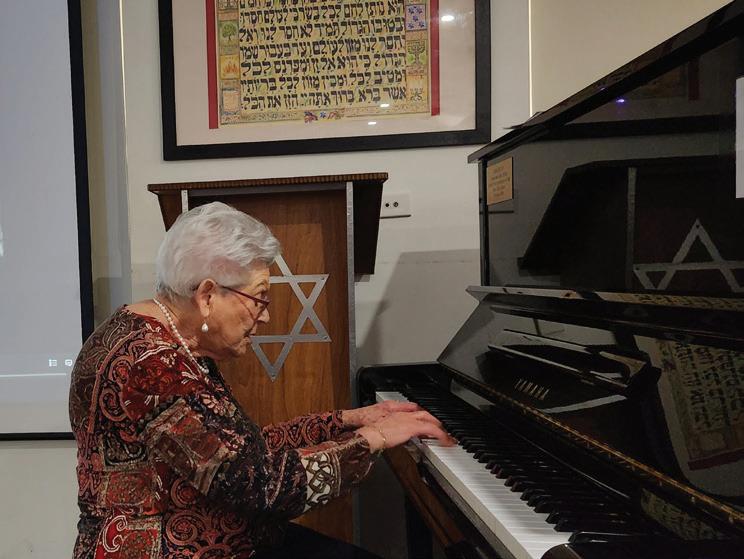
The group surveyed 74 Jewish students (from years 7 to 12) attending 13 state schools and their findings were sobering.
One in three had experienced discomfort at their school due to anti-
Sundays can be a very lonely time, especially for seniors. Sometimes they have no family living close by. Sometimes teenage sporting events and other commitments mean seniors cannot catch up with their children and grandchildren on weekends. And sometimes, sadly, there are no close family members or friends to get together with.
But every fortnight there is a simple remedy to long, lonely Sundays for seniors. They can come and join the audience at COA’s Sunday movie presentation. And they do, with some participants coming from as far as Strathfield, Allawah, and Hornsby to join the happy crowd.

The COA Sunday movie has been running since 2008 and has always included an intermission and afternoon tea to give attendees a chance to catch up over coffee and cake. And if they have nothing in common, they

to Victoria Education Minister James Merlino. “We expected it was just going to be him, but there was such an overwhelming response. Ministers who were not even part of it came to listen and propose ideas or express an interest in being involved. It exceeded all our expectations, Loven said.
The Victorian Department of Education has now begun implementing Holocaust education as a mandatory and full unit as part of the curriculum. To that end, they are collaborating with Yad Vashem in Israel to develop a Holocaust education program.
“It was something that we wanted and needed for the community,” said Loven. “The fact that it was implemented so swiftly, astonished us.”
In June, Victoria become the first Australian State or Territory to ban the public display of the Nazi symbol in recognition of its role in inciting antisemitism and hate.
Israel comments, Jewish stereotypes or Jewish jokes. Holocaust studies were either tokenistic or not undertaken at all.
“During COVID-19 and lockdown, we saw the progression of antisemitism online,” Loven said. “In the brief moments that we were able to return
to school there were rockets aimed by Hamas at Israel, yet many people were bringing it up and voicing anti-Israel opinions; it was a very uncomfortable environment.”
Last year, the group was invited to give a presentation on their report
And more changes are afoot to combat ignorance, antipathy and discrimination.
The Victorian government has pledged to give $2m to Courage to Care, a B’nai B’rith project aimed at educating school aged students to be upstanders in the community.
can always discuss the film they are watching. In fact, the intermission is the real purpose behind the movie presentation. And, occasionally, the afternoons bring with them a bonus, with long time COA member and volunteer Rhona Adler playing her favourite songs on the piano during the break.
Movies shown are chosen from the best loved classic films and Oscar winners from the 1930s onward, leaning heavily on musicals. Never shown is a Holocaust film. Many of the regular participants lived through the Holocaust or the consequences of it and have no wish to be reminded of this awful period in Jewish history.
Recently, the COA audience enjoyed a showing of Casablanca, often voted in the top five best films of all time. Even though it was definitely a film concerning escaping Europe during the war, it never touched on the horrors of that war for most Jewish families. In fact, it utilised a number of actors and writers who themselves had escaped the Nazi regime. The leader of the Nazi occupiers is played by a Jewish German actor who was living as a war refugee in the USA.
Most participants had never seen the film on a big screen before and as COA always tries to show subtitles, many reported that they could finally understand all the dialogue.
So, the next time you are at a loss on how to spend your Sunday, or if you have a parent or older friend looking for somewhere to go, why not share a Sunday with peers and friends at the COA movie presentation afternoon? Check the centre’s program page on COA’s website https://www.coasydney. org/centre-program for the next movie showings and join the regulars.

The elections, yes again, in Israel are planned for November 1st. By this time no Israeli politician will declare military help to Ukraine because it would have been political suicide in the next touchand-go electoral and coalition-building cycle.
Between 1989 and 2006, about 1.6 million Soviet Jews and their non-Jewish spouses and their relatives, as defined by the Law of Return, emigrated from the former Soviet Union. About 979,000, or 61 percent, migrated to Israel. Another 325,000 migrated to the United States, and 219,000 migrated to Germany.
That makes a large electorate block and even if many of those were from the Ukrainian SSR their identity was shaped by Soviet Russia.
Today the estimates are that there might be 1,300,000 Israelis of SovietRussian descent.
Out of 50,500 new Israelis in 2022 under the Law of Return there were 40,000 new Israeli citizens recognised making an aliya from the conflicted countries of Russia, Ukraine, and Belarus.
Russia provided half of 2022’s new Israelis, with 23,789 documented
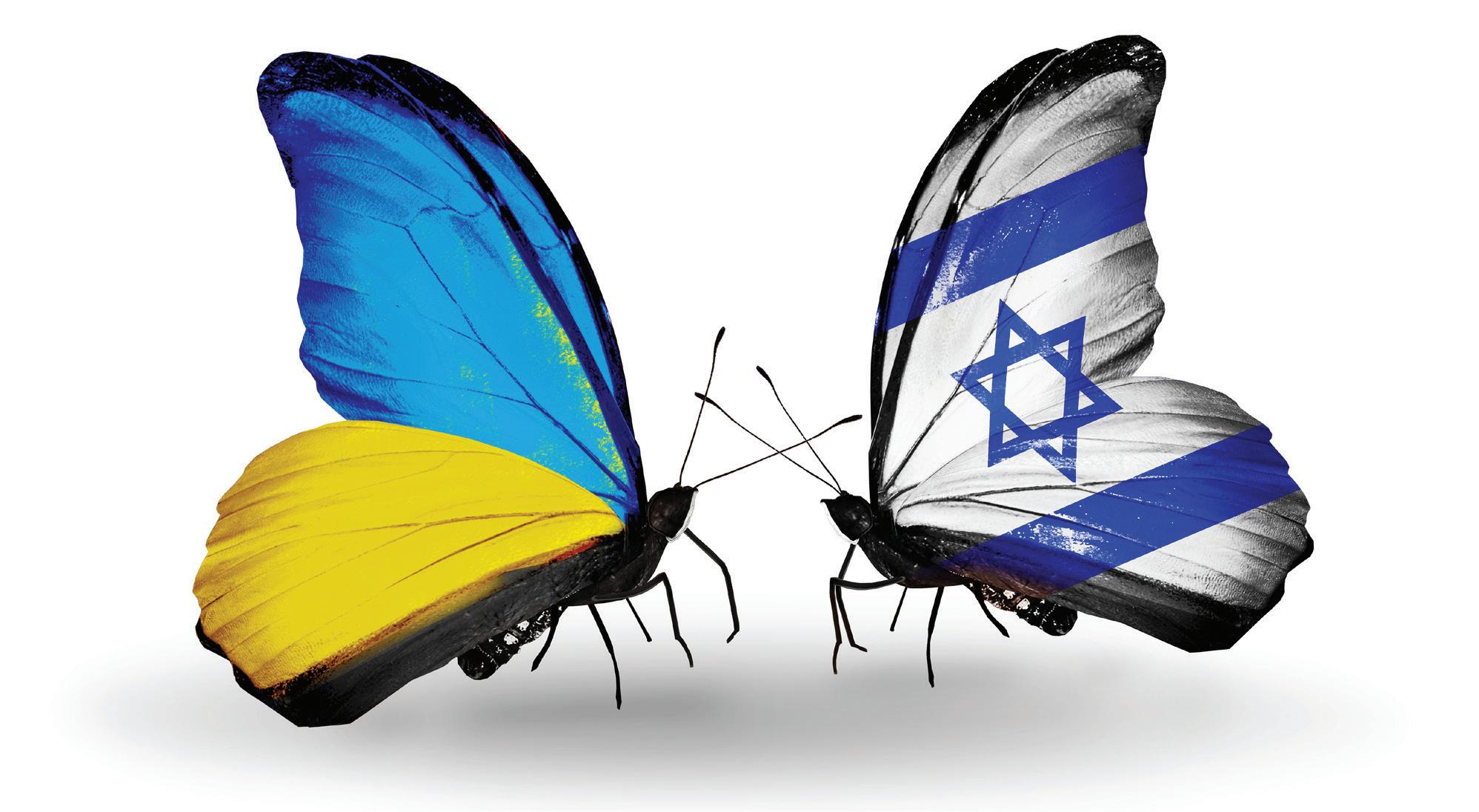
immigrants. Ukrainians taking on Israeli citizenship followed with 13,097, and a much smaller number — 1,316 — of Belarussians.
There are still over 100,000 Jews in Russia and the July 2022 suspension of the activities of the Jewish Agency by the Russian government send them a rather worrying signal.
A quick look at the regional geopolitics Russia largely militarily controls the chaos in Syria to the level that for the last month the IAF didn’t have to commit itself to a single mission on that territory. The last mission was on September 17th, which targeted Damascus International Airport and killed five Syrian soldiers. Israel and Russia have a deconfliction mechanism to prevent unnecessary friction during IAF operations.
The deconfliction mechanism between the two countries continues to work even with the new deployment of Russian forces in the region due to war in Ukraine. All of the IAF operations in Syria are aimed at the containment of Iran’s influences, thus the Iranian regime’s involvement with Shahad 136 drones bombarding Ukrainian cities shall bring a pivot in Israeli policy. The planned deliveries of Iranian Fateh and Zolfaghar ballistic missiles to Russia to be used against Ukraine are even more alarming.
It is generally known where the production of those weapons is organised and there will be no better time to destroy those production centres.
Netanyahu’s ungrounded argument that weapons shall not be delivered to Ukraine because they may end up being traded to Iran is mischievous but it speaks to the emotions of the Israeli electorate before elections.
Cremations are strictly prohibited under Jewish law. The Sydney Chevra Kadisha alone provides services according to Jewish tradition and Halacha.
Oxford & Wallis Streets, Woollahra Email: info@sck.org.au Website: www.sck.org.au
Interestingly out of 14 people who held the office of the Israeli Prime ministers, six were born in the nowadays Ukrainian or Belorussian territories. Those were Moshe Sharett, Levi Eshkol, Golda Meir, Menachem Begin, Yitzhak Shamir and Shimon Peres. Moshe Sharett was born in Kherson, which is just about to be liberated by the Ukrainian army marking another low in the Russian army efforts of the last seven months.
The historical parallels of a Jewish leader like the Ukrainian president defending universal values can be quoted endlessly and all of those are at the very foundation of Israeli identity. Observing the Holocaust monuments
of Babyn Yar in Kyiv or Drobytsky Yar in Kharkiv shelled by Russian artillery in search of civilian Ukrainian victims presents the full futility of the “Never Again” political slogan.
The Israeli Diaspora Affairs Minister Nachman Shai tweeted on October 16th: “There is no longer any doubt where Israel should stand in this bloody conflict,” wrote Shai. “The time has come for Ukraine to receive military aid as well, just as the US and NATO countries provide.” This was immediately paired with the threatening Telegram response by Dmitry Medvedev, an ex-Russian president and member of the security council. “Israel seems to have decided to supply weapons to the Kyiv regime. That would be a very rash decision, for it would damage all the interstate relations between our countries.
He said Israel might as well recognise [Stepan] Bandera and [Roman] Shukhevich as its heroes. Bandera was the leader of the Organization of Ukrainian Nationalists (OUN), and Shukhevich led the Ukrainian Insurgent Army (UPA). Both organisations were involved in the ethnic cleansing of Jews and Poles in Ukraine under German Nazi occupation. As a result of this exchange, Benny Gantz and Benjamin Netanyahu took a position against the military support for Ukraine.
The call for those politics will come after the elections on November 1st. As for now, Israel still sits on a fence being paralysed in its decisions by the perpetual electoral mode the country experiences. November 1st, 2022 will bring the fifth Knesset election in the last four years. In May 2022 Israeli pragmatism went as far as banning its military partners in some Baltic states and Germany to transfer the Spike ATGM missiles to Ukraine. This makes an interesting policy for a country that is a beneficiary of 3.8 billion USD annually from US military aid. The side the US is taking in the current Russian war against Ukraine doesn’t have to be guessed.
A new, sensitive, coming of age story highlighting the African American and Jewish experience is a vehicle to propel two bright young actors onto the world stage. Set in Queens, New York City in 1980, Armageddon Time is the opening night feature at the Jewish International Film Festival (www.jiff.com.au).
Thereafter, it will be released nationally in Australia on 3rd November.
14-year-old Banks Repeta plays sixth grader Paul Graff, born into a Jewish middle class family.
With an artistic bent, he is different to other students in his class.
His goals don’t marry with those of his parents, but he is particularly close to his grandfather, Aaron Rabinowitz, a role filled by Anthony Hopkins.
One day, grandad opens up to Paul about the trauma experienced by Rabinowitz’s mother that saw her leave Ukraine and make a new home and life in America.
Jaylin Webb, 16, portrays Johnny Davis, whose start to life has been far than ideal. From a broken home, Johnny – who is repeating sixth grade – is living with his grandmother who is increasingly ailing, suffering from dementia.
He is treated shamefully by his teacher and his aspiration to be an astronaut appears but a forlorn hope. Johnny and Paul become firm friends, against Paul’s
“We were so comfortable with each other. We were able to be so tight and have real conversations, even when we weren’t filming.
“That was really nice because a lot of the dinner conversations (in the film) were improv (improvised),” Banks says.
Jaylin says while he is fortunate not to be able to relate firsthand to what Johnny experiences, he has family members who do.
He says he talked to them before he appeared in the film.
“They just told me about their experiences. They told me about how it affected them mentally.
“I really tried to channel that throughout those (troubling) scenes,” Jaylin says.
parents’ wishes. Armageddon Time is a deeply personal story for writer and director James Gray (Ad Astra).
He revisited his own upbringing to create characters that inhabited his formative years.
Banks Repeta and Jaylin Webb told The Jewish Report that in casting them Gray was keen to see what they could bring to the table in their respective roles.
The pair bonded in the short time they had to get to know each other before filming began and that is immediately evident by what we see on screen. Banks
It is 1980 in Queens, New York City.
Two six graders form an unlikely friendship that causes all sorts of friction.
Paul Graff (Banks Repeta) is from a good Jewish family who escaped oppression in Europe.
African American Johnny Davis (Jaylin Webb) is from a broken home. He is living with his grandmother who is increasingly ailing, suffering from dementia.

Paul is a gifted budding artist, while Johnny (who is repeating grade 6) dreams of a future with NASA.
Both fall out with their teacher, Mr Turkeltaub (Andrew Polk) and bond while being prevented from participating in gym with the rest of the class.
Paul is particularly close to his grandfather Aaron Rabinowitz (Anthony Hopkins), a principled man who thinks the world of Paul and enjoys spending time with him. One day, grandad opens up to Paul about the trauma experienced by his (Rabinowitz’s) mother that saw her leave the Ukraine and make a new home and life in America.
Rabinowitz is the glue that binds the family together.
Paul has a much pricklier relationship with his dutiful but overextended mother Esther (Anne Hathaway) and plumber father Irving (Jeremy Strong).
They have aspirations for Paul that don’t match his own desires. As the boys’
friendship develops, they find themselves increasingly at odds with authority figures.
Meanwhile, Rabinowitz encourages Paul to be a mensch (a Yiddish word meaning a person of integrity and honour).
Written and directed by James Gray (Ad Astra), Armageddon Time is a deeply personal coming of age story – a layered work of fine craftsmanship.
With it, Gray has revisited his own upbringing and created characters that inhabited his formative years. The film is characterised by a series of outstanding

grew up in the film industry. His father is a motion picture camera operator and his mother an actor.
Jaylin was a born entertainer who acted in plays during his middle school years and decided to transition to film during COVID-19 quarantine.
Banks says it was the dinner scenes in Armageddon Time that got him closest to what it was like being in a Jewish family.
Apart from Anthony Hopkins as grandad, Anne Hathaway (Les Misérables) and Jeremy Strong (The Big Short) are cast as Paul’s mother Esther and father Irving.
He would like the film to attract a broad audience “so everyone is aware of the discrimination that black people and Jewish people had to undergo”.
For his part, Banks hopes Armageddon Time reaches people that haven’t experienced the oppression the movie portrays “so they can know what it was like”.
The Jewish International Film Festival starts in Melbourne on 24th October, in Sydney on 25th October and in Brisbane on 26th October.
Opening night on the Gold Coast, as well as in Perth, Hobart and Canberra is on 27th October.
performances, starting with newcomers Repeta and Webb.
Both inhabit their characters with distinction.
There is a vulnerability about them, which is authentic and captivating.
Paul is trying to make sense of a world where he knows he is different from other kids, while Johnny is alienated and hamstrung by racism and poverty.
In a bravura showing, Hathaway is a knockout as a mother who is both caring and impatient.
Hopkins slots comfortably into the role of a grandfather who dishes out worldly wisdom. There is much about Armageddon Time that is emotionally wrought.
It is sensitive film about love and loss, class, struggle and expectation.
Many of the scenes stayed with me long after I exited the cinema.
Armageddon Time is a movie that deserves to be seen and appreciated for its insight into the American Dream.
It scores an 8 out of 10.
For centuries Jews have been vital in the production and marketing of beer.
Here are eight surprising facts about Jews and the history of this popular drink.

Beer-making dates to ancient times. Egyptian tombs depict pictures of beer brewing; Hammurabi’s Code, from 18th century BCE Mesopotamia, mentions beer; the ancient Greeks learned how to brew beer from Egyptians and brought this knowledge to Europe.
Ancient Israel, in contrast, favoured wine over beer. But after the destruction of the ancient Temple in Jerusalem in 586 BCE, Jews were exiled to nearby Babylonia and adopted the Babylonian taste for beer. The Talmud records four different types of beer, brewed from barley, dates, figs and beer (Pesachim 107a). The modern usage of hops, a plant related to mulberries, in beer is also mentioned in the Talmud, which notes hops’ medicinal properties of being a preservative and antiseptic (Avodah Zarah 31b).

Beer’s popularity with ancient Jews is also evident in the fact that beer is an acceptable substitute for wine in the Havdalah ceremony, marking the transition from Shabbat to the rest of the week.
In the Middle Ages, Germany embraced beer. By law, Jews were barred from brewing the popular national drink. That didn’t change until the 1800s, but Jews became central to the beer industry in another way: by growing a flower called hops, which is a crucial ingredient in beer.
By the time the Nazis rose to power in the 1930s, Jews controlled about 70 per cent of German’s important hops industry.
Germany’s 1516 “beer purity law” mandated that beer be made only with hops, barley, yeast and water. Hops were suddenly in great demand, creating a key business opportunity.
At the time, many Jews were being expelled from German cities. Resettling in the countryside, Jews began to grow and trade hops, soon dominating the industry. By the time the Nazis rose to power in the 1930s, Jews controlled about 70 per cent of German’s important hops industry.
Ironically, the purity of German beer was noted with a mark that looked decidedly Jewish – a six-pointed star, much like (though not related to) the Star of David.
A 1764 census of Polish Jews found that approximately 80 per cent of Jews living in villages worked in the alcohol trade, distilling and selling wine, vodka, liqueurs and beer. Poland’s vodka and beer industries grew in the 1500s, as landowners devoted more land to grow the grains needed for these drinks and set up taverns to sell them in. Many of
the innkeepers who ran these taverns were Jews and seen as more sober and responsible than the general population.
So ubiquitous were these Jewish managers that the image of a kindly Jewish innkeeper became ingrained in Polish life. One example is the character of Jankiel the tavern-keeper, a wise and patriotic Jew created by Poland’s national poet Adam Mickiewicz in his work “Pan Tadeusz”.
In the 1800s, Jews found themselves gradually edged out of the beer and liquor trade in Poland by a series of anti-Semitic laws, though even then many Christian tavern owners would continue to clandestinely employ Jewish managers, who had so shaped Poland’s beer and tavern culture through the ages.
Ale in Colonial America was a popular drink, often brewed at home for family consumption. At a time when water supplies were often contaminated, beer provided a relatively safe alternative to drink. Unlike modern beers, some of these beers were less alcoholic, making them more suitable to drink regularly.
It seems that Jews in Colonial times partook of beer, as well. In his 2004 book “The Jews in Colonial America”, author Oscar Reiss provides the example of the household of Judah Hay, a middle-class Jew in New York City, who once lived with his family in a home rented from Founding Father John Jay. The family
recorded monthly spending 1.3 British pounds on three barrels of beer, more than enough to drink ale every day, if they wished.
In Germany, Jews were finally allowed to make and sell beer in 1868 and they quickly revolutionised the industry, improving beer production in Germany and beyond. Bernhard Purin, director of Munich’s Jewish Museum, who recently staged an exhibit on “Jewish Brewery Tales”, notes that “Jews in Germany (integral in the creation of Oktoberfest) were always very successful in times of modernisation and so they came into the brewing business when there was a need for modernisation”.
Jewish brewers introduced modern manufacturing methods for beer. One of the pioneers was Jakob von Hirsch, a Jewish baron, who envisioned a modern beer factory near Munich. Blocked for years by locals who resented his plans, Baron Hirsch eventually opened Planegg Castle Brewery in 1836, becoming Germany’s very first industrial-scale beer brewer.
Lowenbrau, one of Germany’s best known beer brands, was also shaped by the vision of its Jewish chairman, Moritz Guggenheimer, who was one of the first to realise the potential of moving freight by rail, and turned what had previously been a small local brewery into Munich’s largest beer exporter. By World War II, after merging with another
Jewish-owned beer company, it was Germany’s largest brewer. (Under the Nazis, the company was turned over to non-Jewish owners and its last Jewish chairman was sent to a concentration camp.)
German Jews helped spread their newfound brewing knowledge outside Germany. A Jewish amateur brewer named JC Jacobson travelled to Munich in the 1840s to learn about cutting edge brewing technology. When he returned to his native Denmark, he founded Carlsberg Beer, still Denmark’s largest and best-known beer brand.
Germany’s iconic decorated beer steins, surprisingly, are a Jewish invention. Germans traditionally drank their beer from plain, unadorned steins. Starting in the 1800s, Jewish entrepreneurs began making ornate, decorative steins. The trend caught on and today beautiful beer steins are a quintessentially German art form.
As waves of German immigrants, including Jews, poured into America in the 19th Century, they brought their taste for beer and their know-how in producing top German-style brews with them. One of the best-known beer labels founded by a German Jewish family was Rheingold Beer, started by a Jewish immigrant named Samuel Liebermann in Brooklyn in 1850.
The current explosion of craft-beer brewing in America has included a high number of Jewish producers making boutique beers.
Beer in the Promised Land Israel might not have been known for beer in ancient times, but today the Jewish state boasts a cutting-edge beer scene, with high quality microbreweries and annual beer festivals in Jerusalem and Tel Aviv.
The first beer company in modern Israel was a French-Israeli venture known as Palestine Brewery Ltd, opened in 1934 in the Israeli town of Rishon Le Zion. The company produced a light lager and a root beer-like drink called Nesher Malt. In the 1950s, Rishon Le Zion became home to another beer company, Cabeer Breweries, that invented Goldstar, a German-style pale lager. In 1968, Maccabee started producing a Czechstyle lager that quickly became Israel’s best-selling beer.
Israel’s first licensed microbrewery, Dancing Camel, made a startling discovery when it started producing beer in 2006: remains of a 5,000-yearold brewery were discovered near the company’s modern Tel Aviv brewery. The company embraced Jewish history, even creating one beer made with date honey and made according to a 4th century Jewish recipe, and dozens of other Israeli breweries followed suit.
Today, Israel is home to about 40 microbreweries. Israeli brewers have invented gluten-free beer, produced the world’s first date ale and have created special beers that capture the flavours of the Jewish state, such as pomegranateflavoured beer made for Rosh Hashanah or beers flavoured with etrogs.
Nomi Kaltmann talks to the captain of the Tel Aviv Cheetahs and finds out how Australian Rules Football has gotten a foothold in the Middle East.

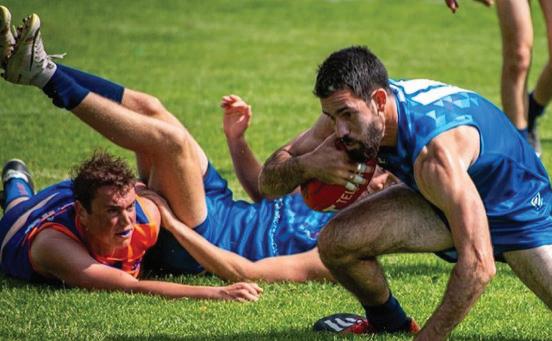
Shir Shalev, an Israeli who has never visited Australia, is not necessarily the first person you would pick as the captain of the Israel AFL team. Shalev’s love of Aussie Rules was sparked by accident a few years ago when he was studying in Jerusalem. One day he happened to walk past a group of Israelis and Arabs from the Jerusalem Peace Lions playing footy in the local park.
“They offered me the opportunity to join in and I loved the game,” Shalev says.
Athletic, the 26-year-old has always enjoyed sport. “I have lived with a ball in my hands or on my leg since forever. I play all sports including soccer, basketball, volleyball and tennis.”
Shalev was born in Israel and grew up on Moshav Gea in the south of the country, where he did not meet any Australians. “I still remember the first time I played in Jerusalem. They said ‘it is not American football – you handball it’. I did not buy it. I did not know footy at all. I did not know what they were talking about. I said: ’that’s not real’.”
From this chance encounter, Shalev became hooked on the game and would play weekly with the team in Jerusalem. A year later, when he and other players moved to Tel Aviv, he decided to start a team – the Tel Aviv Cheetahs – hoping that there would be interest. From there, it just grew and grew. These days, the Tel Aviv Cheetahs are the only AFL team in Israel, which represents the country at international AFL tournaments.
The genesis of AFL in Israel was a 2008 joint initiative by the Peres Center for Peace and its Palestinian partner, the Al Quds Association for Democracy and Dialogue. The team was created with 13 Israeli and 13 Palestinian players, with the aim of using footy to help increase dialogue between Israelis and Palestinians and to encourage peaceful co-existence. While the AFL Peace Team ceased operating around 2011, AFL Football caught on in Israel, with
a small but dedicated group of Israelis playing every week. The Israeli team, captained by Shalev, is part of the AFL Europe League and competes in the AFL European Championships. The most recent championship was held a few months ago in Edinburgh, Scotland, where the Israelis finished eighth out of the 16 teams that competed.
“Most of the Tel Aviv team are Israeli guys with a connection to Australia –people who have family from Australia or have lived there for a bit. There are also a few Israelis who are like me,” Shalev says.
On average, about 15 players come to weekly training sessions in Tel Aviv and they are connected through a WhatsApp group.
Avi Gillis, 31, is a member of the Cheetahs and is grateful for the good times he has had with the team. It helps him retain a connection to Australia, from where his family made aliyah more than 25 years ago. “The way I got to know footy is through my Aussie family. Most of my mother’s family is in Melbourne; they are big St Kilda fans. I grew up with
a bit of footy. I always followed St Kilda,” he says. Gillis is still working on honing his skills. “I am all right. I have decent kicking skills and pretty good defensive instincts. I don’t find the ball that much; I’m usually tracking other players. I am not the strongest player overhead, but I do my best trying to win on the ground.”
He chose to play AFL in Israel because he enjoys the sport and camaraderie it encourages. “The nice thing about playing footy in Israel is that it is unique there. It is not well known. It is a fun thing to introduce to people, plus it’s a slice of my heritage,” he says.

Playing with Israelis has extra benefits, he says. “Israelis bring a unique approach to footy. They are very fast and fit. That is common in footy in Australia, but in Europe that is our strength. That is how we get our wins. We are a small and quick team. Usually, we give away a fair bit of size, but we make up for it with speed,” he says.
For Trent Smythe, the chair of AFL Europe, who now lives in London, the excitement that people across Europe have from participating in Aussie Rules
makes his role totally worth it. “The spirit of the game that is AFL means that players understand the concept of mateship and friendship,” he says. “It is a very old game. The good thing about it is that many of the endearing qualities of the game are quite Australian – that sense of mateship and community. When you see people playing AFL in another country, you feel that we are exporting some of that culture and others get to experience it.”
It’s something Shalev, as the captain of AFL Israel, understands. “It’s the best sport in the world, but the world doesn’t know about it yet. Still, the word is spreading,” he says.
Footy also represents the need for discipline in a wide range of areas.
“With footy, you have to be good at everything. Kicking. Handballing. Good with your feet and hands. It’s super fun. You need to be fit but also strong,” he says. “I used to be a soccer fan and I used to watch it, but now I only watch footy. I can’t watch soccer anymore, it’s too slow.”

Back in the daysof-old, the High Holidays were kept very differently to the way we are now accustomed. When we dwelt in our ancient land with the holy Temple in Jerusalem, the festivals were pilgrimage events. Family groups would journey there and if they did not arrive in time for Rosh Hashanah, they would aim to reach it to see the Yom Kippur service with its highlight of the Kohen Gadol, the High Priest, exiting the Holy of Holies. No doubt, it was a great wonder to witness his shining face reflecting the glory of the Shechina, the Divine Presence. Indeed, our sages count ten open miracles that occurred regularly in the Temple.
Following the solemnity of Yom Kippur came the "time of our joy", the festival of Sukkot. In addition to reminding us of the Exodus, it was also a celebration of the successful crops harvested over the previous year. Additionally, the delight at the drawing of the water which commenced on the festival’s second day, knew no bounds. Our sages commented that a person who has not witnessed this has never seen true joy

Intriguingly, G-d promises that a bumper crop will be granted in the sixth year to cover the seventh - many have claimed to be recipients of those blessings.
In ancient Israel, once the Shmita year ended, Hakhel followed. In preparation for the upcoming six years of toil, every person was commanded to gather. Every single Kohen, Priest, in Jerusalem would take a golden trumpet and blow it through the streets – a clarion call for all.
in their lifetime. At the end of Sukkot, pilgrims would sojourn home inspired by all they had seen and experienced. Often little children were too young to make the trip and their mothers remained behind to care for them – as we see in the story of Chana and the infant Samuel. However, there was one extraordinary exception, the special event after the end of the ‘Shmita’ year, known as Hakhel.
The Jewish calendar is divided into cycles of seven years. In the same way that we work on six days with the seventh as our Day of Rest, our Shabbat, so too for six years do farmers in Israel work the land and the seventh year is designated as that of Shmita. This is a window of time
Some people reach the end of our High Holiday season, collectively sigh, and refer to this period on our lunar calendar as a marathon month – of shule services, socialising and Sukkah-hopping. I can’t deny that each is woven inextricably through the meaningful month of Tishrei.
Yet it is so much more. Because whilst it is joyous to revel in present festivities, the chaggim deliver fundamental home truths that we can continually draw upon throughout the remainder of our year – and without doubt they inspire us all to reach new aspirational heights.
As the rhythm of our regular week returns, now is the perfect time to explore this. To comprehend the challenges of our modern world, we must first hark back to Temple times. Then, on the holiest day of the year, the High Priest would enter the most sacred chamber within the Sanctuary to perform special services.
Upon exiting, he would recite a brief prayer in which he asked for “a year of livelihood and plenty, a year of rain and produce, that sovereignty will not be taken from the house of Israel.” Yet he had one additional intriguing request which, at first glance, may seem different to the rest: “Let it be a year in which no woman will miscarry.”
Granted, this is so heartfelt and important, yet the High Priest did not extend this with successive suggestions
such as asking for women struggling to conceive to become fertile.
Undoubtedly, his prayer was multilayered – yes, he was referring to physical miscarriages, yet he was also incorporating our emotional ones too.
Millions of us reflect over the High Holidays and are metaphorically ‘pregnant’ with great ideas, dreams, visions, hopes and ambitions. Yet we all know from first-hand experience that all too often, not every gestational goal grows. One might attribute it as laziness, stress, cynicism or even an overarching fear of failure. There can be myriad reasons.
Whatever the root cause, inner potentials may remain stifled never to see the light of day – we may ‘miscarry’
when land is permitted to lie fallow and all produce is shared amongst the poor; affording farmers the opportunity to engage in loftier spiritual pursuits.
In modern Israel, Shmita is also observed and impacts those who refrain from working the land and those who join the State of Israel’s program of temporarily selling arable land to gentiles. This option is enacted by those who feel they would not be able to overcome the economic hardship of ceasing to work their land for that duration of time.
According to many opinions, land owned by a gentile is not subject to Shmita laws. Those who choose to follow the law exactly as was originally intended are called “Shmita Heroes."

Unlike any of the other pilgrim festivals, Hakhel was also for women and children. All were commanded to come to Jerusalem on the first day of Chol Hamoed Sukkot within the Temple precinct, where the King of Israel would read from the Torah on a specially built stage. The aim? To inspire people to be in awe of G-d throughout all their days.
This year, 5783, is the first in the Shmita cycle and is a year of Hakhel. While we currently have neither a King nor Temple, our Torah teachings are timeless. We are all able to spiritually re-enact Hakhelwhether via a family gathering; school assembly, or any other communal event, we should consciously infuse each with the spirit of Hakhel.
This will empower us all to soulfully serve Hashem with awe during each and every blessed day we have been granted.
our own resolutions and dreams, so counterintuitive to what we truly want and desire!
The nineteenth century sage, Rabbi Naftali Tzvi Yehudah Berlin, was known as the Netziv. He was the rabbi and dean of the famed Volozhin yeshiva in Lithuania. During his lifetime he authored many tomes on the Bible and Jewish law, all still studied today.
At the completion of one of his works he reflected that in his youth he had not been studious. At one point, his parents, after having already sacrificed so much for his Torah education, contemplated altering his professional trajectory from scholar to carpenter.
Young Naftali was distraught at the thought and begged for one additional
year, during which he not only thrived, but ultimately grew into a Torah luminary. On reflection, he knew that working as a carpenter, or completing any craft apprenticeship was noble and valued. He knew he would have done the profession justice with his creations.
Yet, he also contemplated that when it was his time to face his Creator at the end of his life, and reflect on time spent, G-d would potentially be shown bookcases built, but not the books he had authored.
Each profession is respected. Yet the dramatic result is that in the Netziv’s case, the thousands of students he taught to live ethical and holy lives would never have benefitted; the hundreds of thousands who continue to this day to be enlightened by his writings would simply not have had that dimension of Torah illumination.
In this context, when the High Priest originally prayed that no woman should miscarry, we understand that his entreaties are directly applicable to each Jew annually post-High Holidays. With this insight, each of us can consciously be more engaged and involved so our personal dreams and nascent ideas can be enhanced, improved and realised for the benefit of all.
Do you have a book to write, a speech to give, a charity to start? Whatever your mission, let’s endeavour to realise our full potential – the positive impact and ripple effect will be felt for generations to come!
The Torah begins with a comprehensive, day-by-day recount of God’s creation of the universe. The Book of Genesis then goes on to detail the ten generations from Adam to Noah, from the birth of man in the ideal world of the Garden of Eden to his rapid descent into a spiritual abyss, far from the perfection into which he was born. The Torah illustrates this spiritual void into which the world descends in the story of Noah: “And God saw the Earth and behold it was corrupted, for all flesh had corrupted its way upon the Earth.” In response, God resolves to give the world a second chance at setting things straight. Noah is told that with the exception of himself, his family and enough animals to replenish the Earth, a flood will envelop and destroy the world. Yet, after being selected from the entire planet to be the single flame from which the rest of life will be rekindled and relaunch history, Noah the righteous man deteriorates into a simple man of the Earth.
“ … Noah was a righteous man (ish tzaddik), perfect in his generations;

Noah walked with God.”[1] The Torah goes on to depict the floodwaters, a ritual bath of sorts for the entire world, cleansing the Earth of all its iniquity.
The greatest universal calamity to have befallen humanity culminates in the first ever rainbow – a beautiful symbol of nature that represents God’s eternal covenant with mankind. The Torah then records a shameful event in which “Noah, the man of the earth (ish adama), debased himself and planted a vineyard”[2] leading to his intoxication and embarrassment. The same Noah who at the start of the parasha is referred to as an “ish tzaddik” is now referred to as an “ish adama” – a palpable contrast noted by the Midrash[3]. What does this difference in title imply?
The ish tzaddik lives for an ideal. Living in a community filled with promiscuity and despite the odds, Noah chooses to follow a code of moral behaviour. Over and above following the actual words of Torah, the ish tzaddik elevates what are seen as mundane experiences. He speaks, eats and conducts himself in venerable fashion. Man is a graft of animal and angel, and thus his challenge is to ensure that he does not descend to an animalistic level, but rather strives towards an angelic way of life. The ish adama, in contrast, is a man of the Earth, void of lofty ideals or aspirations to spiritually enhance his way of life.
Ironically, when Noah is challenged with the immense task of building and sustaining the ark, a microcosm of what will become the new world, he personifies the ish tzaddik. When, on the other hand, his task becomes less momentous as he re-enters daily life on the land, he simply plants grapes in the field and transitions into the more self-absorbed ish adama. The danger of Noah’s sin, in comparison to the very explicit sins that surround him in the generation of the flood, is in its subtlety. He is not morally degenerate, overly arrogant or a pagan wanderer, but simply an ish adama, a person devoid of ideals. So, too, a person’s greatest challenges often come when they are least expected, hidden among the seemingly most mundane moments. All Noah does is plant a vineyard, but it is the motivation behind this act that is central to his demise. He plants the vineyard in order to intoxicate himself and to take pleasure in meaningless behaviour. From Noah’s spiritual descent we can learn to avoid living life on a spiritual plateau, where there is no purpose other than to enjoy ourselves. Rather, we must continue to strive for more. God creates man “betzelem Elokim”,[4] in the image of God and in so doing provides us with inherent responsibility. At the very moment of our creation we were imbued with the responsibility to constantly strive for
perfection and to continually try and emulate God, the epitome of perfection itself.
Often laid-back, easy-going societies are celebrated and envied. However, life cannot simply be built on satisfaction and enjoyment, for this leads to complacency and moral descent. Life must be fuelled by the fiery flames of the ideal human experience – one that embodies growth, yearning and striving for good.
Disengagement from his moral anchor causes Noah to drift and descend towards his ish adama status. The Hebrew term for conscience is matzpun, at the root of which is the term tzafon, meaning north. Embedded in the subtle magic of the Hebrew language lies Noah’s lesson for humankind. We must veer away from complacency and self-gratification, and rather allow our moral north to guide us, to help us elevate the mundane to the sacred and to help us identify right from wrong. Our routine must never consume our identity, but rather it should become the launching pad for greatness, from which we can work towards raising ourselves from a lifestyle of ish adama towards a level of ish tzaddik.
[1] Genesis 6:9
[2] Genesis 9:20
[3] Midrash Tanchuma 3
[4] Genesis 1:27

In this edition KA-certified Rimon Catering is generously sharing its signature Green Papaya Salad recipe. Each Rimon contribution is a treasure and this one is so refreshing you will want to make it on repeat for your lucky family and friends!

Rimon offers comprehensive catering services to Sydney's eastern suburbs and the surrounding precinct. The extensive menu features a variety of appetizers, mains and desserts, as well as finger food, dips and salads, frequently supplemented by seasonal festive delights. All dishes are infused with bursts of flavour and are made from wholesome, flavourful ingredients. Each dish is prepared
daily - fresh to order. Year round, fan favourites are selected, savoured in so many settings. Enjoy the moreish vegetarian spring rolls; chicken schnitzel and smoky eggplant dip –there is truly something for everyone!
Since 2015, Rimon has been catering for a succession of simchas including birthdays; weddings; engagements; corporate events; Shabbat dinners and more.
So if you're planning an upcoming event - get in touch with the Rimon Catering team to find out how it can ensure your magical moment will be a creative culinary success – all expertly and sensitively tailored within your budget!
1 green papaya
1 green mango
300g green beans
2 carrots
Handful fresh coriander
Handful fresh mint
1 punnet cherry tomatoes 100g salted peanuts
1 red chilli – whole and chopped
1 tablespoon fresh ginger - minced ½ cup soy sauce
½ cup brown sugar
2-3 limes
1. Grate or julienne the papaya, mango and carrots.
2. Steam the green beans
3, Chop the mint and coriander
4. Mix the papaya, mango, carrot, beans mint and coriander together in a bowl.
5. Slice cherry tomatoes in half.
6. Add salted peanuts.
1. Mix soy sauce, brown sugar, fresh ginger, chilli and limes.
2. Mix ingredients in the blender.
3. Pour over salad and mix thoroughly.
Here’s a Rimon salad secret: only add the cherry tomatoes and salted peanuts upon serving - this keeps the salad fresh and crunchy!
To contact Rimon Catering call Ze’ev Aronstam on 0403 258 921. Visit www. rimoncatering.com.au to see the extensive range of dips; finger foods; appetisers; mains; sides; salads and platters on offer. Rimon Catering HQ is located at 279 Bronte Road, Waverley.
technical reasons,
was taken by the Church as a direct reference to Christianity. In vain did the rabbis defend the sentence on the grounds that the expression came from the
of Isaiah, or that
prayer came from Joshua, and therefore must predate Christianity. They also reasoned that if the prayer was attributed to a Babylonian sage known as Rav, who lived in 3rd Century Babylonia (Persia), that he never encountered a Christian. Nowadays that line has been restored in certain Siddurim
Gwyneth Paltrow
30.4
The Marais is Paris' most famous Jewish neighbourhood, also known as the Pletzl—Yiddish for little place. This area has been home to Jews since the 13th Century
Palm Branch (Lulav), Citron (Etrog), Myrtle (Hadasim) and Willow (Aravot)
Maccabi Haifa
Isaac Bashevis Singer
Jewish term – KAPOTEH. Here is a list of some common words (yes, we know there are more words in the dictionary that can work, but these words are common to today’s vernacular): KEEPAH, KEEPOT, PHOTO, POPPET, POTATO, TEAPOT, TEEPEE (TEPEE).
Questions/comments – email Yoni at koshercroswords@gmail.com

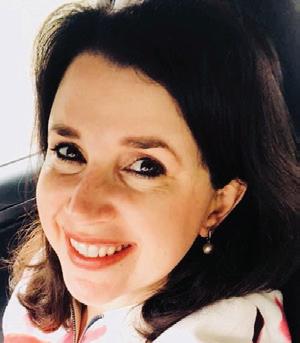
A huge Kol Hakavod and thank you to our incredibly talented and dedicated KA-certified kosher caterers and bakers for a huge assortment of products and services throughout our festive period. From the thousands of round raisin challot to the cakes, biscuits and savoury delights, the entire community thanks you all for your commitment and devotion!
We are excited to introduce a new and fabulous range by the talented Natalie Levy at the helm of Sweet as Funk. You can now purchase KAcertified Cake Popsicles! Enjoy delicious chocolate cake enrobed with dairy chocolate and embellished in the most show-stopping ways. Conveniently, pick up is available from St. Ives or Bondi Junction. Without a shadow of a doubt – your guests will absolutely adore these artisan products – all made with her signature creativity and flair! Many
This product is all natural and our KA logo is conveniently on the back of the packet!
products within the Sauer’s Bakehouse range are KA-certified – it is the home of Australia’s most awarded Turkish bread. The KA is delighted to advise that a new loaf variety is now kosher – is it the Sourdough Aroma Rye – and it is baked with love and served with pride!
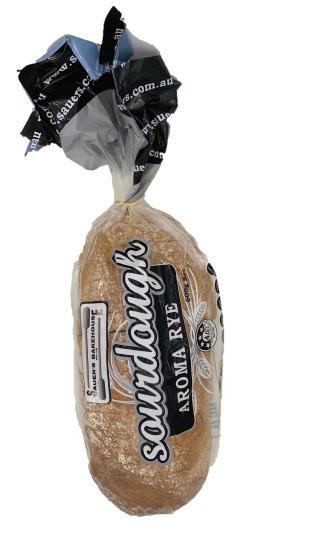
There is a huge interest in kosher vegan products and we are happy to share that Uproot Foods ‘Smoked NOT Salmon’ is now KA-certified.
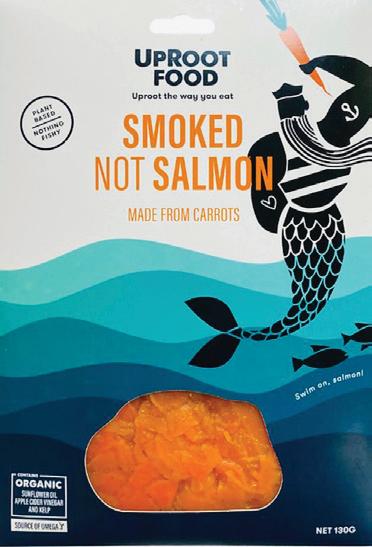
Use it in your bagels, sushi, salads, sandwiches, vegan lover’s breakfast – the possibilities are endless and the most amazing news is that it is made entirely from marinated carrots with a delicious smoky flavour.

Next month, The KA will have a strong presence at Kosherfest in New Jersey, the world’s largest and most attended kosher-certified trade show on planet Earth! It will house over 6000 industry professionals and 325 exhibitors. This year the incredibly diverse HBC Trading has been invited to feature and showcase its outstanding Aussie products as a guests of The KA. It is the umbrella company overarching all those Chef’s Choice, Lovin’ Body and Kura products you see around town –and so many more!
Kosherfest is where kosher decision makers find opportunity and inspiration … it truly is where the global kosher industry does business. It’s mission: to give manufacturers, distributors and suppliers of kosher certified products and services the chance to reach thousands of mainstream and independent kosher trade buyers from across the world. We can’t wait to report back to our KA Kosher Family across Sydney – stay tuned!
• M&M Poultry supplies will be increasing week after week moving forward. The team wants the community to know that it understands recent frustrations and advise that the reduction in supply has been due to a number of factors. These include disruptions due to the chaggim, continued labour shortages across the industry and its recent transition to newer facilities, all impacted the supply chain shortages earlier this month. The M&M team is working tirelessly to rectify this and also to ensure a continuous supply of new and improved products is on offer. It thanks all for displaying such patience.
• The KA advises that Village Finest has a full complement of fresh premium beef and lamb goods. Visit www.villagefinest.com.au to place orders and delivery is free when you
opt to collect from The Bagel Co. as seen within the order form.
• Every Thursday and Friday, you can now purchase Grandma Moses challah; mini challah, along with cinnamon and chocolate babkas @ Parisi's Rose Bay.

• Millee’s Shabbat Shuk is open each week from 8am – visit 525 Old South Head Road, Rose Bay – and contact Dena Miller on 0418 666 901 to discuss catering options for your upcoming simchah.
• Each Friday morning you can purchase the following Soul Gourmet products from St. Ives Greengrocer located at Shop 1, 235 Mona Vale Road, St. Ives. You can find fish balls (regular and curry); fish cocktails; curry cocktails; herring in three ways – chopped/Danish/mustard; mock crayfish; chicken schnitzel; sushi; rugelach and so much more! Please
support KA kosher offerings on the Upper North Shore.
• Jesse’s ‘Meat Me Here’ Food is located directly next to Jesse’s Bakery, and has been a huge success – 443-445 Old South Head Road, Rose Bay. Visit https://meatme-here.square.site/s/order to place your orders.
• Contact Natalie Levy at Sweet As Funk to place your Cake Popsicle orders and so much more on 0407 441 474 or visit www.sweetasfunk.com.

• 7 Fat Cows now offers Flat End Pastrami – visit www.7fatcows.com.au or call 0414 922 736.
• The Randwick Ritz cinema has temporarily stopped offering Serendipity choc tops however in the interim, it now offers Elato mini tubs (a brand certified by Kosher Australia).
• To contact Sauer’s Bakehouse, visit www.sauers.com.au or call 02 9824 5100.
• All Irish whisky is now kosher even without a hechsher. In regard to American whiskys, only kosher certified or approved whiskys are recommended. Additionally, Welsh and Japanese whiskys are also only approved when kosher certified.
• TwoBays Brewing Company – Gluten free beer. Two products are now pareve: Lager and Mandarin Rice Larger
• Precise No Melt Vanilla & Chocolate Flavoured ice creams gluten free 120g Dixie cups (only for those who have medical needs/ trouble swallowing etc) Visit www. precisethickn.com.au
• Chef’s Choice Fresh Harissa Mediterranean in Extra Virgin Olive Oil (Pareve with KA logo on jar)
• Moccona Made in the Netherlands (Pareve): A Hint of Natural Caramel Drizzle Natural Flavour Instant Coffee; A Hint of Natural Hazelnut Swirl Natural Flavour Instant Coffee (both 95g)
• The Nut Shop – Dried Blood Plums Product of Australia. Pareve, must have KA logo
• Heritage Mill Clusters Cranberry Almond and Clusters Pink Lady Apple Crumble (both 750g, both made in Dairy Vessels)
• Coles No Added Sugar Dark Chocolate with Peppermint Chips – 5 individually wrapped bars (only with code A0695) - Pareve
• All Ricola cough drops are acceptable with the exception of hard candies called ‘herb caramel’
• Adamama Farm Pickled goods are KAcertified. For more information, call Mitch Burnie on 0450 623 002
• 7-Eleven Slurpee flavour Sour Citron is acceptable
• Sprite Lemon + Zero Sugar is acceptable
• Chung Jung One – Gochujang Hot Pepper Sauce – OU certified
• James Squire Orchard Crush Pear Cider and Orchard Crush Perry are no longer produced
• Edgell Mexican Mix – Black Beans, Pinto Beans & Red Kidney Beans – Only when Proudly Packed in Bathurst appears on the label
• The following Woolworths Free From Gluten products are no longer acceptable: Beetroot chips; Original Organic Corn Chips; Original Potato Chips and Sweet Potato Chips
• Coles Dark Chocolate Licorice Twists 250g no longer acceptable
• Green’s Original Pancake Shake 375g and 200g – already purchased stock may be consumed – no longer acceptable
















